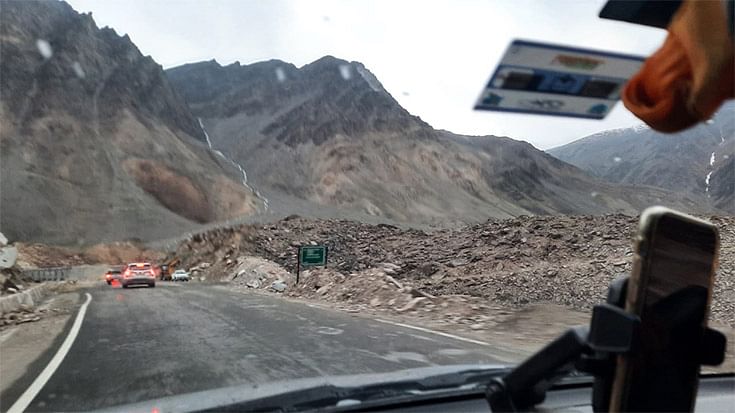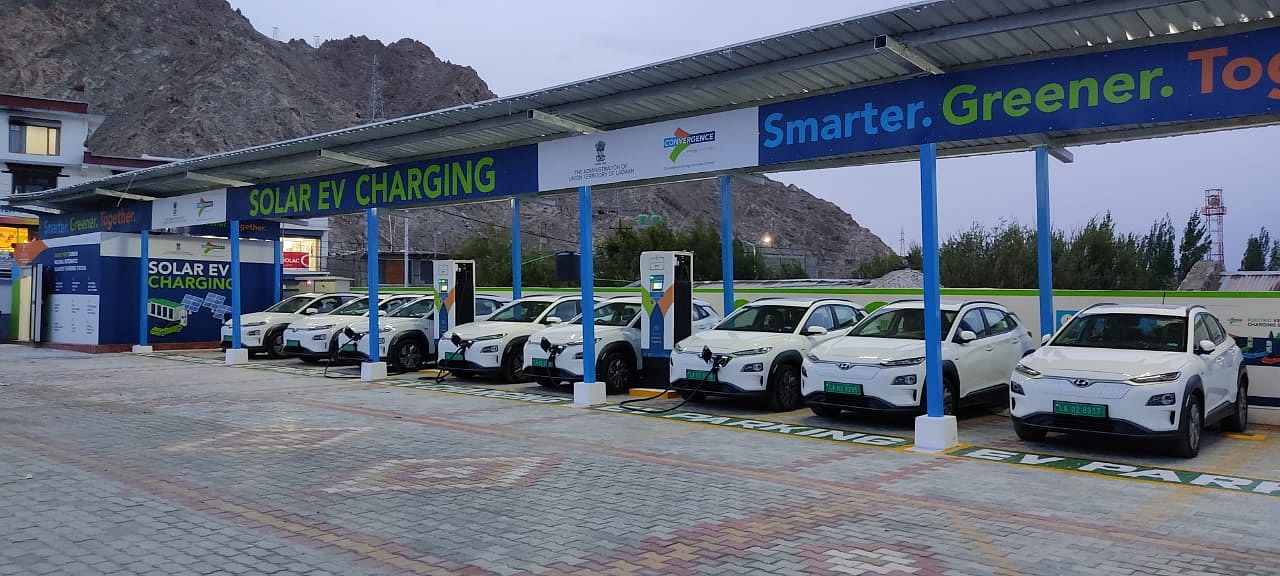Ladakh targets carbon-neutrality, unveils electric vehicle policy
Ladakh’s EV Policy offers 10% capital subsidy on two-, three- and four-wheelers while electric buses get 25% to encourage eco-friendly transport. For EV charging companies, there is a 25% subsidy for the first 15 stations.
The pristine Union Territory of Ladakh is the latest to come up with a specific Electric Vehicle policy. Nestled in the Himalayas, the majestic but ecologically sensitive region has been seeing a strong influx of tourists over the past few years. Tourism contributes around 50% to the GDP of Ladakh and since 2015, the tourist inflow has more than doubled with most of the travel undertaken in fossil-fuelled vehicles.
Ladakh's official announcement of an EV Policy comes just about two years of it releasing its Vision-2050 statement which is high on the focus on carbon-neutrality. Key focus areas include minimising of carbon emissions, promotion of clean energy, developing a green and sustainable public transport system, and connectivity by all-weather roads. Ladakh expects its population to double by 2050, while Leh and Kargil cities are expected to witness continued urbanisation and will become major economic centres in the future. The accent remains on eco-friendly tourism in the from of electric mobility.

Ecologically sensitive Ladakh is a region of incomparable beauty and incentivising purchase and use of EVs will help reduce the existing high dependence on fossil-fuel-powered cars and buses by tourists and also transportation services to this high-altitude region.
Announced on August 17, 2022, Ladakh’s ‘Electric Vehicle and Allied Infrastructure Policy 2022’ will be in force over the next five years till August 16, 2027 and will be implemented through demand incentives to end-users, setting up of a network of EV charging stations and administration of the scheme.
EV buyer incentives
The EV Policy opens with the statement of aiming to “to promote sustainable mobility in Ladakh by kickstarting the sale and use of EVs” and to encourage research, innovation and skill development in EV technology. It aims to enable rapid adoption of EVs in all new domestic and commercial vehicle registrations and also promote electric mobility in public transportation and government fleets. All e-vehicles have been exempted from payment of road taxes.

The EV Policy offers a capital subsidy of 10% on purchase of electric two-, three- and four-wheelers and 25% on commercial vehicles (see data table above).
The demand incentive is available for EV buyers in the form of an upfront-reduced purchase price to enable wider adoption, which will be reimbursed to the vehicle dealer by the UT. In the event of an EV being bought (at 100% ex-showroom price) from a dealer based in another state/UT but is registered and used in Ladakh, the reimbursement shall be given to the individual beneficiary and not to the dealer, mentions the policy.
 On Independence Day, Ladakh saw the inauguration of a solar PV-based EV carport, connected with rooftop power plant and battery energy storage system. Hyundai Kona EVs are being deployed in the government fleet. They come with battery warming tech to offer the best experience in the hilly terrain with no compromise in performance. (Photo: CESL/Twitter)
On Independence Day, Ladakh saw the inauguration of a solar PV-based EV carport, connected with rooftop power plant and battery energy storage system. Hyundai Kona EVs are being deployed in the government fleet. They come with battery warming tech to offer the best experience in the hilly terrain with no compromise in performance. (Photo: CESL/Twitter)
Incentives for EV charging facilities
Ladakh’s EV Policy also offers incentive for EV charging facilities. While electrical power required for EV charging will be charged at domestic rate, common public charging facilities in parking areas of residential, commercial, institutional establishments will be allowed be set up. Likewise, public EV charging facilities at fuel pumps will be allowed to set up subject to charging station area and charging infrastructure qualifying rating, fire and safety standards
Commercial public EV charging stations for two-wheelers, cars and buses will be eligible for capital subsidy of 25% on equipment/machinery or Rs 500,000 (whichever is less) per station for the first 15 EV charging stations).
In future, the UT may incentivise the usage of EVs for commercial operations from the permit fee requirement for plying a transport vehicle, exemption or reduction of net UT-GST for leasing and owning an electric fleet. Furthermore, it may incentivise operating of battery swapping centres in the future once the EV policy is fully in operation.
Like many other states which have introduced EV policies to accelerate demand for electric mobility, Ladakh will endeavour to mandate creation of charging infrastructure at all newly constructed housing societies, office complexes, shopping arcades/malls, market areas, hotels and guesthouses. It also plans to have 10% of notified parking spaces reserved for EVs and reduced parking charges for the eco-friendly vehicles.
ALSO READ
Haryana EV policy proposes tax benefits for hybrids, imported EVs
Maharashtra’s EV policy high on incentives for buyers and industry
Tamil Nadu grants two-year tax exemption to EVs
Telangana announces EV policy, targets Rs 23,000 crore investment by 2030
Andhra Pradesh’s EV policy targets investment of Rs 30,000 crore by 2030
RELATED ARTICLES
Cosmo First diversifies into paint protection film and ceramic coatings
The Aurangabad, Maharashtra-based packaging materials supplier is leveraging its competencies in plastic films and speci...
JSW MG Motor India confident of selling 1,000 M9 electric MPVs in first year
The 5.2-metre-long, seven-seater luxury electric MPV, which will be locally assembled at the Halol plant in Gujarat, wil...
Modern Automotives targets 25% CAGR in forged components by FY2031, diversifies into e-3Ws
The Tier-1 component supplier of forged components such as connecting rods, crankshafts, tie-rods, and fork bridges to l...






 20 Aug 2022
20 Aug 2022
 7440 Views
7440 Views












 Autocar Professional Bureau
Autocar Professional Bureau




